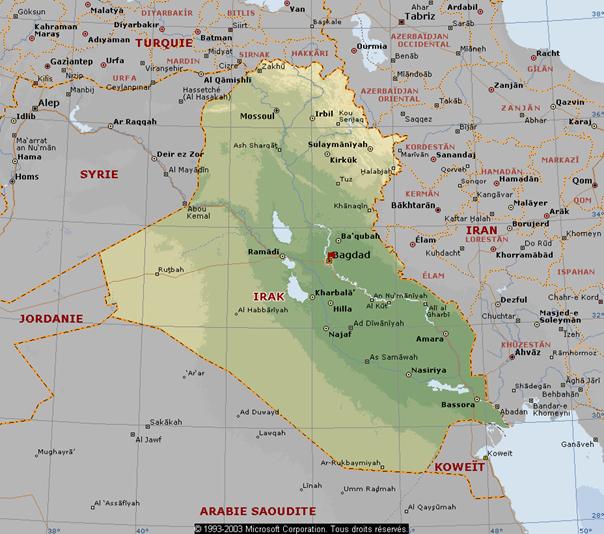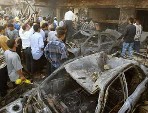

http://www.reuters.com/newsArticle.jhtml?type=topNews&storyID=5412408
Five Contractors Among 13 Dead in
Mon Jun
14, 2004 04:59 AM ET

By
Lin Noueihed
It
was the second suicide bombing in the Iraqi capital in 24 hours and coincided
with a wave of assassinations aimed at the new interim government appointed to
take over from the U.S.-British occupation authorities on June 30.
Interim
Prime Minister Iyad Allawi said five foreign workers had been killed in the
morning rush-hour attack, which devastated a busy street and ripped the front
off one building.
"The
terrorists are trying to prevent the transfer of power and sovereignty on June
30," Allawi told a news conference.
Hospital
officials said at least eight other people had been killed and dozens wounded,
many of them with severe burns or limbs torn off by the blast near Tahrir (Liberation)
Square.
The
U.S.-led Coalition Provisional Authority (CPA) employs thousands of contractors
from many nations. Some are involved in reconstruction projects, others are
private security guards.
Two
Iraqi policemen at the scene said the blast had killed five people in one CPA
vehicle which was reduced to a charred wreck. A police source said a bomber in a
red four-wheel-drive vehicle had set off the explosion, which he said hit two
other CPA vehicles and wounded five or six occupants.
Crowds
of shocked and angry Iraqis swarmed over the area, some trying to pull survivors
from the damaged building before police fired in the air to clear a path for
emergency vehicles.
Dozens
of people hammered on two of the CPA vehicles caught in the blast, chanting
"
On
Sunday a suicide car bombing killed up to 12 Iraqis near a U.S.-Iraqi base in
Senior
Powell
acknowledged the difficulty of providing security for
POLITICAL
MOTIVE
Last
month, a suicide bombing killed Izzedin Salim, the head of
U.S.
National Security Adviser Condoleezza Rice said the attacks were an attempt
"to shake the will of the new interim government" in the run-up to the
June 30 handover.
"We
know that the period leading up to sovereignty and indeed the period immediately
after sovereignty is likely to be one in which the terrorists and the Saddam
loyalists enhance their efforts at violence," she said.
Interim
President Ghazi Yawar described the assassinations as "random killings"
and said violence would diminish once
Yawar
said there were no plans to destroy Abu Ghraib prison despite an offer by
President Bush to tear down the jail where some Americans abused Iraqi prisoners.
The
Witnesses
said three buses left the jail on the outskirts of
The
International Committee of the Red Cross, which described abuses at Abu Ghraib
in a report leaked in May, said last week the number of detainees there had
fallen to 3,291 this month from
Yawar
said the prison, already notorious as a place of torture and killing under
Saddam Hussein, had cost more than $100 million and such money should not be
wasted.
"We
need every single dollar we have in order to rebuild our country instead of
demolishing and rebuilding," he said.
Yawar
said the new Iraqi government would take control of the Abu Ghraib prison after
June 30.
http://www.iol.co.za/index.php?sf=2813&click_id=2813&art_id=qw1087215840719B262&set_id=6

14
juin 2004
Dozens hurt as blast rips up
Adding to the carnage, the explosion brought down part of a building and
destroyed a row of shops, including a liquor store, in crowded
It was the second major blast in 24-hours. At least seven Iraqis died in a
suicide car bomb near a United States-led occupation base in the capital on
Sunday.
US and Iraqi officials have warned of an upsurge in violence ahead of the June
30 handover of sovereignty in
'Their
bodies have been taken to a morgue at
About
30 minutes after the Monday morning attack, a civilian contractor was killed
when a roadside bomb exploded and gunfire hit an occupation convoy in eastern
The huge blast in
"The occupation told us that two British, one American, one French and one
Filipino national were among the dead," a diplomatic source said.
"Their bodies have been taken to a morgue at
Three foreigners were also wounded, said Iraqi Prime Minister Iyad Allawi,
adding that the foreigners had been helping to rebuild
'No,
no,
In
addition, at least seven Iraqis were killed and about 60 wounded in the bombing,
according to a tally by three local hospitals and the
An AFP photographer saw a charred corpse in a burnt vehicle and four bodies
covered in sheets at the site of the blast in the street lined with restaurants,
shops and houses.
The vehicle convoy, two tan Mitsubishis and a GMC, was heading down the street,
not far from the main headquarters of the US-led occupation across the river,
when the explosion struck at 8.15am (04h15 GMT).
Major Mohammed Saleh, the senior police officer at the scene, said: "It was
a three-car American convoy. A suicide car bomber in a small Volkswagen Brasilia
drove between the cars and blew himself up," Saleh said.
Other witnesses said they thought a parked car was detonated by remote control
as the convoy sped by, but there was no independent confirmation.
The blast blew one vehicle off the road and onto a central grass square.
An angry mob quickly crowded around the two other vehicles that stood charred
but intact on the road. Chanting "No, no,
Police fired shots into the air but were unable to disperse the crowd who jumped
onto the vehicles and then set fire to them. They threw alcohol from one of the
wrecked shops into the flames.
"The Americans are in charge of the disasters that happen in
"They are responsible for this explosion," he said.
People piled wounded on to the back of trucks and inside cars and rushed them to
the hospital. Some medics bandaged wounded and bloodied Iraqis on the pavement.
Wounded Iraqis leaned on rescuers as they left the damaged building.
Saad Jassim Mohammed, 24, who was eating in a restaurant when the attack struck,
said: "I rushed up to the building and I took out six dead bodies and I
took out two people who were alive."
Army helicopters buzzed overhead as ambulance sirens wailed. Later in the
morning four tanks and at least 20 military Humvees rumbled up to the site and
soldiers equipped with riot shields sealed off the area.
Since the new Iraqi caretaker government was unveiled on June 1, there has been
a wave of car bombings and assassinations of government officials.
"This is another despicable example of a targeted attack on those who are
assisting the rebuilding of
At a news conference,
"We will take decisive and strong positions to protect the honour, money
and lives of Iraqis," he said.
Earlier in the morning five bus loads of prisoners left the notorious Abu Ghraib
prison outside the capital, while in the south of Iraq, British Defence
Secretary Geoffrey Hoon began a surprise 24-hour trip to the city of Basra,
where most of Britain's 8 000 troops in Iraq are deployed. - Sapa-AFP
![]() Published
on the Web by IOL on 2004-06-14 14:24:02
Published
on the Web by IOL on 2004-06-14 14:24:02
© Independent Online 2004. All rights reserved. IOL
publishes this article in good faith but is not liable for any loss or damage
caused by reliance on the information it contains.
http://www.fortwayne.com/mld/ohio/news/world/8921900.htm
Posted
on Mon, Jun. 14, 2004
Car bombing kills 10, starts riot in Baghdad
By TOM LASSETER
Knight
Ridder Newspapers
The
outburst of rage came after a suicide car bomber crashed into a convoy of three
sport utility vehicles carrying Westerners just after
A
General Electric spokeswoman confirmed that the five dead comprised three
employees of Granite Services - a GE company - and two security workers.
Officials in
The
front side of a two-story building that contained shops and apartments was left
in rubble, and at least seven cars were charred and blasted by shrapnel.
There
have been at least 15 car bombings in
The
violence comes as the country is counting down the days to June 30, when
"It
is an unfortunate and cowardly incident that happened today," Prime
Minister Iyad Allawi said. "Five civilians have been killed and another
three civilians severely injured. These people have been helping
Despite
Allawi's words of assurance, the scene on the street suggested that popular
revulsion against the
When
American soldiers from the 1st Calvary Division arrived in a handful of Humvees,
they were quickly surrounded by Iraqis chanting, "Down! Down!
A
group of soldiers tackled one man, dragging him away from the crowd. Two other
soldiers made obscene gestures involving their middle fingers.
After
about two hours, the soldiers drove off, leaving behind a group of Iraqi
policemen, who soon evacuated the area.
For
a few minutes, a lone Iraqi police pickup was stuck in the middle of the crowd.
An officer stepped out of the vehicle and shot his
The
screams of "Yes! Yes! Muqtada Sadr" seemed to last forever. Al-Sadr is
a firebrand Shiite Muslim cleric whose militia has fought with
By
noon, the area had been secured by swarms of Humvees, tanks and a long row of
American soldiers wearing riot gear and carrying shields.
One
of the looted stores carried a brand of Jordanian beer, and much of the crowd
grabbed cans of "Philadelphia Beer" and hurled them into the fires
leaping from the SUVs, cheering when the cans popped like gunfire. Two men
outside the shop fought each other, one with a knife and the other a
screwdriver, over a case of the brew.
A
group of men danced around a dead man pulled from one of the vehicles. People
grabbed some of the beer and poured it over the body. A man waved what looked
like a British passport in the air, laughing and pumping his fist.
Hospitals
were crammed with the wounded and dying.
"It
is not acceptable to Allah. I don't think any human being with a conscience
would accept this," said Mohammed Abdul Kadir, 71, who was angry over the
attack on the convoy. He was knocked to the ground by the blast and half-buried
by bricks from a falling building.
"Look
around me. Look at these people," Kadir said, pointing to men whose
clothes, like his, were splattered with blood.
Across
town, in another hospital, Bassim Mutashir, 20, sat on a bed next to his cousin.
The two men, construction workers from Hilla, had come to
Mutashir's
head was bandaged and he was in pain.
"With
the new Iraqi government, the situation will stay the same and the people will
never feel safe," he said.
His
cousin lay next to him, unconscious, with several serious shrapnel wounds. A
doctor walked up and looked at the two for a long moment before speaking.
"Our
surgery room is full," he said. "You'll have to go to another
hospital."
Mutashir
said he was afraid his cousin would be dead by day's end.